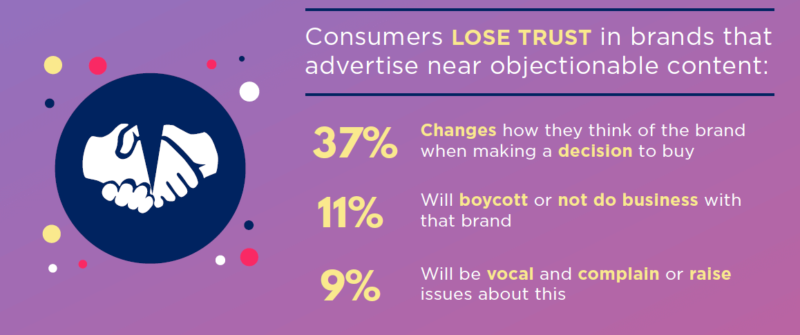37% of consumers say ads placed next to offensive content impact brand perception
A new survey from The CMO Council reveals how negative ad experiences influence the way consumers think about brands.

In March, Google faced a firestorm from brands after an investigation by The Times of London revealed Google Display Network and YouTube ads were being served up alongside extremist content.
At the time, a number of advertisers — first in the UK and then in the US — boycotted Google’s ad network.
“Until Google can ensure this won’t happen again, we are removing our ads from Google’s non-search platforms,” said an AT&T spokesperson who confirmed the brand was very concerned its ads had possibly shown up alongside content promoting terrorism and hate.
In response, Google increased its brand safety controls within its ad platforms — but the situation put a spotlight on an issue that is now more relevant than ever: how the placement of an ad, and the content around it, could impact brand perception as much as the ad itself.
According to the newly released “How Brands Annoy Fans” survey from The CMO Council, 37.3 percent of 2,000 consumers polled said ads that appear next to objectionable content change how they think about the brand when making a purchase decision.
Ten percent said they would boycott the brand, and 9 percent said they would be vocal or complain, raising issue with the brand.

“The concern is that the sheer proximity to, or perceived association with, hateful, distressing or brand-contradictory content can undermine that brand, no matter how effective that ad is measured in isolation,” says The CMO Council.
The survey also asked participants about “fake and inappropriate news” and how it influences their content consumption. Seventy-five percent of the survey participants confirmed they were worried about the growing number of fake or biased news sites, and 60.4 percent said they are turning to more trusted content sources and channels.

Consumers ranked social media as the least trusted media source — after friends, television, search and newspapers.
At 88.4 percent, a large majority of the survey respondents said a negative ad experience may make them think differently about a brand or reconsider doing business with the brand.
When asked what would result in a negative ad experience, 19.2 percent defined it as an obnoxious or intrusive ad, 18.4 percent said discriminatory or hateful ads, 11.7 percent listed irritating or annoying ads, and 11.6 percent said ads that were racist or stereotype people.

The CMO Council’s survey, conducted in partnership with Dow Jones, polled 2,000 consumers across North America and the UK, with 81 percent of the participants from the US.
You can download the full report here: “How Brands Annoy Fans.”
Contributing authors are invited to create content for MarTech and are chosen for their expertise and contribution to the search community. Our contributors work under the oversight of the editorial staff and contributions are checked for quality and relevance to our readers. MarTech is owned by Semrush. Contributor was not asked to make any direct or indirect mentions of Semrush. The opinions they express are their own.
Related stories
New on MarTech